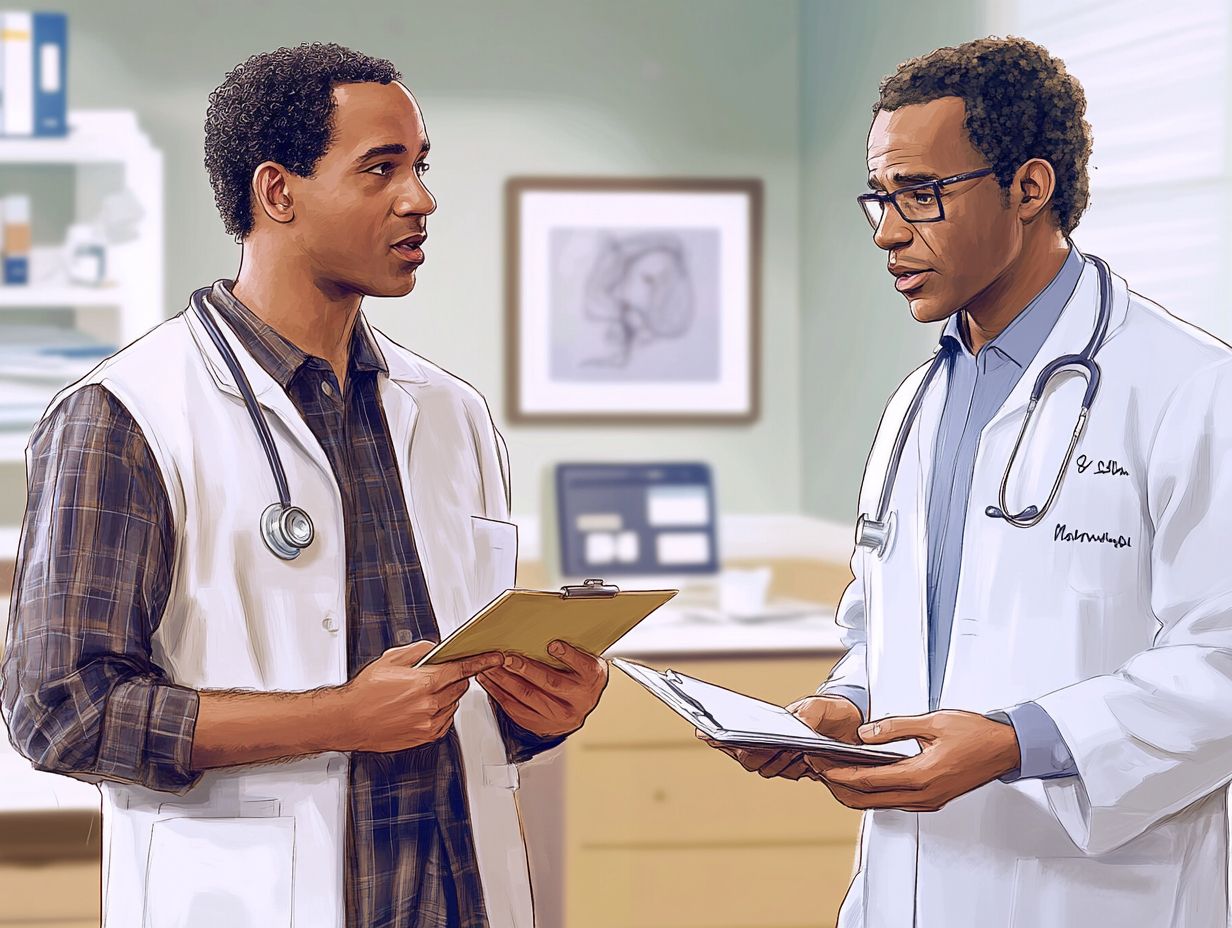When facing a cancer diagnosis, engaging openly with your oncologist is crucial to understanding your condition and making informed decisions about your care. Here are five essential questions to ask your oncologist today to gain clarity and ensure you receive comprehensive support, including understanding your treatment options, potential clinical trials, and available support resources:
- What Is My Diagnosis and What Does It Mean? – Understanding the type and stage of cancer is vital for informed decision-making and planning with your healthcare team.
- What Are My Treatment Options and What Are the Pros and Cons of Each? – Explore the various treatment modalities, such as chemotherapy, radiation, and immunotherapy, to weigh their benefits and potential side effects tailored to your condition.
- How Will My Treatment Plan Be Monitored and Adjusted? – Regular assessments and feedback are essential for optimizing your treatment efficacy and supporting your quality of life.
- What Support Services Are Available to Me and My Loved Ones? – Utilize resources like counseling, support groups, and financial assistance to help manage emotional challenges and enhance care.
- What Lifestyle Changes Can I Make to Support My Treatment? – Adopt dietary and lifestyle changes to strengthen your treatment outcomes and improve overall well-being during this journey.
These questions will help you navigate your treatment journey with confidence, ensuring that your care aligns with your personal goals and needs. Engage with your healthcare team for a collaborative and personalized approach to your cancer treatment.
Key Takeaways:
1. What Is My Diagnosis and What Does It Mean?

A comprehensive cancer diagnosis involves understanding the pathology, genetic testing results, and staging to tailor a personalized treatment plan.
A cancer diagnosis identifies the type and stage of cancer a patient has.
A cancer diagnosis informs treatment options and impacts overall health.
Understanding the diagnosis helps patients make informed decisions, engage with their multidisciplinary healthcare team, and formulate questions to ask about treatment goals and prognosis.
2. What Are My Treatment Options and What Are the Pros and Cons of Each?
Discussing therapy options with your oncologist helps identify the most effective approach, whether conventional or available through clinical trials.
Treatment options for cancer include chemotherapy, radiation therapy, targeted therapy, and immunotherapy.
Chemotherapy targets rapidly dividing cancer cells but can cause side effects like fatigue, nausea, and hair loss.
Radiation therapy uses high-energy particles to destroy cancer cells and can cause localized side effects like skin irritation.
Targeted therapy focuses on specific genetic mutations, while immunotherapy boosts the immune response against cancer.
Effectiveness varies by cancer type, requiring a tailored approach based on individual patient conditions, medical history, and expert advice from cancer specialists.
3. What Are the Potential Side Effects of My Treatment?
It is important to communicate with your healthcare team to understand the possible side effects associated with each treatment modality, such as chemotherapy or radiation therapy.
The potential side effects of treatment, such as chemotherapy or radiation, include:
- Fatigue
- Nausea
- Hair loss
- Changes in appetite
Understanding these side effects is important for managing quality of life during treatment and preparing for potential impacts on daily life and mental health.
Patients should discuss symptoms with their healthcare team to manage side effects effectively, utilizing coping strategies and support resources as needed.
4. How Will My Treatment Plan Be Monitored and Adjusted?
Your treatment plan will be monitored and adjusted through regular appointments that include assessments, test reviews, and patient feedback on symptoms.
The healthcare team uses this information to decide on necessary changes to the treatment plan, ensuring it remains effective and supports patient quality of life. Health monitoring and regular communication with your care team are vital for addressing healthcare needs promptly.
5. How Can I Manage Any Physical or Emotional Side Effects?
Managing physical and emotional side effects involves engaging in light physical activity, practicing mindfulness, maintaining proper nutrition, and seeking emotional support through therapy or support groups during treatment.
Emotional support from friends, therapy, and support groups can help manage emotional side effects and enhance mental health.
These methods promote resilience and improve well-being during treatment.
6. What Support Services Are Available to Me and My Loved Ones?

Support services available to cancer patients and their loved ones include:
- Counseling
- Support groups
- Workshops
- Financial assistance programs
Organizations like Memorial Sloan Kettering Cancer Center and MD Anderson Cancer Center offer these services, including patient access service and counseling, to help manage emotional challenges and improve patient care.
Engaging with support services provides crucial resources and community support during treatment.
7. How Can I Communicate Effectively with My Healthcare Team?
Effective communication with your healthcare team involves preparing a list of questions, expressing concerns directly, and fostering open dialogue to ensure your healthcare needs are met effectively.
Effective communication involves asking about:
- Treatment options
- Side effects
- Alternatives
while sharing anxieties to ensure a collaborative approach. Open dialogue helps align treatment with personal goals and needs.
8. What Lifestyle Changes Can I Make to Support My Treatment?
To support cancer treatment, lifestyle changes involve adopting a diet rich in fruits, vegetables, whole grains, and lean proteins, engaging in regular physical activity, and practicing stress management techniques like mindfulness or meditation. Such changes promote health management and treatment effectiveness.
These changes can strengthen the immune system, enhance energy levels, maintain physical strength, and improve mental resilience during treatment.
9. Are There Any Clinical Trials or Experimental Treatments That I Can Participate In?
Clinical trials and experimental treatments are available for cancer patients seeking new therapy options.
Patients can participate in clinical trials to access cutting-edge treatments not widely available.
Consulting with an oncologist is crucial to understand eligibility and potential benefits or risks of participation.
10. What Are the Long-Term Effects of My Treatment?
Long-term effects of cancer treatment may include:
- Fatigue
- Mobility issues
- Changes in organ function
- Anxiety
- Depression
Ongoing follow-up care helps monitor these effects and supports overall health management.
Discussion with healthcare providers is crucial for addressing these long-term effects.
11. How Can I Best Prepare for Appointments and Keep Track of My Progress?

To prepare for appointments and track progress in cancer care, document symptoms, changes in health, and a list of questions for your healthcare team.
Keep a record of medical history, treatments, and side effects to provide comprehensive information.
Tracking treatment milestones helps patients understand progress and engage with healthcare providers.
12. What Are the Signs of Treatment Success or Failure?
Signs of treatment success include reduced symptoms, decreased tumor size, and improved quality of life.
Signs of treatment failure involve tumor growth, persistent symptoms, and adverse side effects.
Regular monitoring helps identify these signs, guiding necessary adjustments to treatment plans.
13. How Can I Advocate for Myself and My Treatment Plan?
Advocating for yourself and your treatment plan involves actively participating in your healthcare by preparing questions for appointments, understanding diagnoses, and exploring treatment options.
To advocate for yourself, educate yourself on available treatments, ask questions during medical appointments, and communicate your values and preferences to create a personalized care plan.
14. What Are the Next Steps in My Treatment Journey?
The next steps in your treatment journey involve undergoing additional tests to refine the diagnosis, including genetic testing and assessment of lymph nodes, and discussing treatment options such as medication or surgery with your healthcare team.
Proactively engaging with your healthcare providers, asking questions, and attending regular follow-ups are critical to managing and adjusting your treatment plan effectively.
15. How Can I Take Care of My Mental and Emotional Well-Being During Treatment?
Taking care of mental and emotional well-being during treatment involves using coping strategies like mental health counseling, therapeutic support groups, and relaxation techniques such as deep breathing or mindfulness, ensuring patient empowerment and resilience.
Building a supportive network of loved ones is critical for encouragement and companionship.
Frequently Asked Questions

What are the most important questions to ask my oncologist today?
1. What type of cancer do I have and what stage is it in, including details from pathology and potential cancer-causing genes?
2. What treatment options, including chemotherapy, radiation therapy, and clinical trials, are available for my specific type of cancer?
3. Will I need to undergo any additional tests or procedures, such as genetic testing or biopsies?
4. What are the potential side effects of the recommended treatment, and how will they be managed?
5. Are there any alternative or complementary therapies that may benefit me, and how can I access support resources?
How will my cancer treatment plan be tailored to my individual needs?
1. What factors, including medical history and prognosis, were considered when determining my treatment plan?
2. How will my overall health and any other medical conditions impact my treatment, and what role does the care team play?
3. Can you explain the potential risks and benefits of each treatment option, including those available through clinical trials?
4. Will I be involved in the decision-making process for my treatment, ensuring alignment with personal treatment goals?
5. How often will my treatment plan be reviewed and adjusted, if necessary, to optimize treatment timeline and effectiveness?
What should I expect during and after my cancer treatment?
1. How long will my treatment last and how often will I need to come in for appointments with my oncologist?
2. Will I need to make any lifestyle changes during my treatment, such as diet or exercise?
3. What symptoms or side effects, like those from chemotherapy or radiation therapy, should I watch out for and how can they be managed?
4. Will I be able to continue working or participating in my daily activities during treatment, and how can I maintain quality of life?
5. What type of follow-up care, possibly with multidisciplinary teams, will I need after my treatment is completed?
Are there any clinical trials or research studies that I may be eligible for, such as those at Memorial Sloan Kettering Cancer Center or MD Anderson Cancer Center?
1. Can you explain the purpose and potential benefits of participating in a clinical trial, and how it may affect my prognosis?
2. What are the eligibility criteria for any current trials or studies, including those involving genetic testing or new therapy options?
3. Will I still be able to receive standard treatment or other treatment options if I choose to participate in a trial?
4. Are there any additional costs or risks, such as emotional support needs, associated with participating in a trial?
5. How will my participation in a clinical trial impact my overall treatment plan, patient care, and progress?
What resources, including support resources and patient access service, are available to support me throughout my cancer journey?
1. Are there any support groups or counseling services for cancer patients and their families, possibly focusing on mental health and coping strategies?
2. Can you recommend any reliable sources for further information and education about my cancer, including expert advice from cancer specialists?
3. Are there any financial assistance programs available for cancer treatment to address healthcare needs?
4. How can I best communicate with my healthcare team and address any concerns or questions to ask, which may include discussions with trusted friends?
5. Are there any specific lifestyle changes, such as diet and exercise, that may benefit me during treatment, contributing to better health management?
How can I advocate for my own health and be proactive in my cancer care with the support of medical professionals?
1. What steps can I take to ensure I am actively involved in my treatment plan, focusing on patient empowerment and effective health decisions?
2. How can I keep track of my medical records, appointments, and medications related to my cancer diagnosis?
3. What questions should I ask to better understand my disease diagnosis and treatment, including treatment effectiveness and treatment timeline?
4. Are there any warning signs or symptoms to watch out for during my treatment, especially concerning pathology and cancer-causing genes?
5. Can you recommend any reliable resources for additional support and information about cancer care, such as those provided by MSK-IMPACT?





